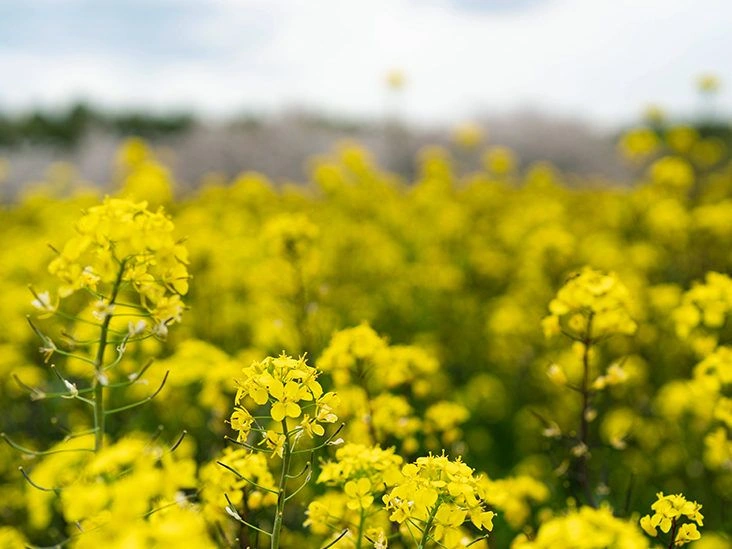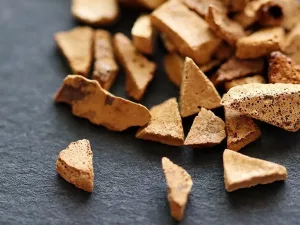Mustard oil, extracted from the seeds of the mustard plant, is a staple in many South Asian kitchens.
Recognized for its bold taste, sharp scent, and high smoke point, it’s frequently used for sautéing and stir-frying vegetables across regions such as India, Bangladesh, and Pakistan.
Although pure mustard oil is prohibited for use as a cooking oil in countries like the United States, Canada, and much of Europe, it’s commonly used topically as a massage oil, skin serum, and hair treatment (1).
Mustard essential oil — a concentrated oil obtained from mustard seeds via steam distillation — is also available and is approved for use as a flavoring agent (1).
Below are eight potential benefits of mustard oil and mustard essential oil, as well as practical ways to use them.

1. May inhibit microbial growth
Several studies indicate that mustard essential oil has notable antimicrobial activity and may limit the growth of certain harmful bacteria.
In a laboratory study, white mustard essential oil reduced the growth of multiple bacterial strains, including Escherichia coli, Staphylococcus aureus, and Bacillus cereus.
Another in vitro investigation compared the antibacterial potency of various essential oils such as mustard, thyme, and Mexican oregano against pathogenic bacteria, finding mustard essential oil to be the most potent.
Additionally, several lab studies report that mustard essential oil may suppress the growth of certain fungi and molds.
However, since most findings come from test-tube research, further studies are necessary to understand how mustard essential oil might influence human health.
summaryLaboratory studies suggest mustard essential oil may reduce the growth of some bacteria and fungi.
2. May support skin and hair health
Pure mustard oil is frequently applied topically to support skin and hair care.
People add it to DIY face masks and hair treatments or blend it with wax to soothe and repair cracked heels.
In places such as Bangladesh, it’s traditionally used for infant oil massages, believed to strengthen the skin barrier.
Although many individuals report reduced fine lines, fewer wrinkles, and enhanced hair growth, most current evidence for these topical benefits is anecdotal.
If you plan to use mustard oil on skin or scalp, always do a patch test first and apply sparingly to avoid irritation.
summaryMustard oil is commonly used to promote hair and skin health, but most supportive evidence is anecdotal.
3. May ease pain
Mustard oil contains allyl isothiocyanate, a compound extensively researched for its effects on pain receptors (7).
Though human trials are scarce, an animal study showed that adding mustard oil to mice drinking water desensitized specific pain receptors and helped manage widespread pain.
Mustard oil is also a source of alpha-linolenic acid (ALA), an omega-3 fatty acid that may reduce inflammation and alleviate pain associated with conditions like rheumatoid arthritis.
Keep in mind that extended topical exposure to undiluted mustard oil can cause severe skin burns.
More human research is required to assess the safety and efficacy of mustard oil for pain relief.
summaryAn animal study suggests mustard oil may reduce pain by desensitizing certain pain receptors; its ALA content may also help reduce inflammation and pain.
4. May hinder cancer cell progression
Some promising studies indicate that mustard oil and its constituents may slow the growth and spread of particular cancer cells.
In an older animal study, feeding pure mustard oil to rats inhibited colon cancer growth more effectively than corn oil or fish oil.
Another animal investigation found that mustard seed powder rich in allyl isothiocyanate reduced bladder cancer growth by nearly 35% and helped prevent invasion into the bladder muscle.
Test-tube research showed similar outcomes, with allyl isothiocyanate isolated from mustard essential oil decreasing bladder cancer cell spread.
Further studies are needed to determine how mustard oil and its components affect cancer in humans.
summaryAnimal and laboratory studies suggest mustard oil and its compounds may reduce the growth and spread of some cancer cells.
5. May benefit heart health
Mustard oil is rich in monounsaturated fatty acids, a form of unsaturated fat found in foods like nuts, seeds, and other plant oils.
Monounsaturated fats are associated with several cardiovascular advantages.
Research suggests they may lower triglycerides, blood pressure, and blood sugar — all recognized risk factors for heart disease.
Additionally, replacing saturated fats with monounsaturated fats may reduce LDL (bad) cholesterol, which helps protect heart health.
Despite the established benefits of monounsaturated fats, studies examining the direct effects of mustard oil on heart disease have produced mixed results.
For instance, a small study of 137 participants in North India found that higher mustard oil consumption was associated with a greater history of heart disease.
Another Indian study reported that people consuming more ghee (clarified butter) had lower cholesterol and triglyceride levels compared with those consuming higher amounts of mustard oil.
Conversely, an older Indian study of 1,050 individuals found that regular mustard oil use was linked to a lower heart disease risk compared with sunflower oil.
Therefore, additional research is required to clarify how mustard oil and mustard essential oil influence heart health.
summaryEvidence is mixed, but mustard oil contains monounsaturated fats that may lower several cardiovascular risk factors.
6. May reduce inflammation
Traditionally, mustard oil has been applied topically to ease arthritis symptoms, relieve discomfort, and reduce inflammation related to conditions such as pneumonia or bronchitis.
Although much of the current evidence comes from animal research, one mouse study showed that consuming mustard seed reduced several markers of psoriasis-related inflammation.
Mustard oil also contains omega-3 fatty acids like alpha-linolenic acid.
Omega-3s are involved in regulating inflammatory responses and may help lower oxidative stress and inflammation.
More human studies are necessary to determine how mustard oil use influences inflammation in people.
summaryAn animal study found mustard seed consumption reduced psoriasis-related inflammation; mustard oil’s omega-3s may also help lower inflammation and oxidative stress.
7. May be used for cold symptom relief
Pure mustard oil is often used as a home remedy for cold symptoms such as coughs and congestion.
It can be combined with camphor — commonly found in chest rubs — and applied to the chest.
Another method is a mustard oil steam inhalation: add a few drops of pure mustard oil to boiling water and inhale the steam.
However, there is currently no scientific evidence proving that mustard oil is effective for respiratory conditions.
summaryWhile mustard oil is sometimes used as a natural remedy for cold symptoms, there’s no evidence to confirm it provides benefits.
8. High smoke point
The smoke point is the temperature at which an oil begins to break down and smoke.
When an oil exceeds its smoke point, flavor can be negatively affected and fats may oxidize, creating harmful reactive compounds known as free radicals.
Pure mustard oil has a high smoke point of roughly 480°F (250°C), comparable to many cooking fats.
This characteristic makes it a popular option for high-heat cooking methods like frying, roasting, baking, and grilling in countries such as India, Pakistan, and Bangladesh.
Additionally, it is largely made up of monounsaturated fats, which are more stable under heat than polyunsaturated fats.
Still, remember that pure mustard oil is banned as a vegetable oil in multiple countries, including the United States, Canada, and many European nations (1).
summaryPure mustard oil features a high smoke point and is mainly composed of monounsaturated fats, which are more heat-stable than polyunsaturated fats.
How to use it
Pure mustard oil is restricted for culinary use in many nations, including the United States, Canada, and European countries (1).
The restriction is due to erucic acid, a fatty acid present in mustard oil that can negatively impact heart health (30).
By contrast, mustard essential oil is produced via steam distillation of mustard seeds and is recognized by the Food and Drug Administration (FDA) as generally recognized as safe (GRAS) for use as a flavoring agent (1).
Although different in production and regulation, both pure mustard oil and mustard essential oil originate from mustard seeds and share several beneficial compounds.
Both can be diluted in a carrier oil and applied topically as massage oils or added to homemade skin serums and hair treatments.
Always perform a patch test: apply a small amount to your skin and wait at least 24 hours to check for redness or irritation.
There are no established dosing guidelines for mustard oil, and human research on topical use is limited.
For topical applications, it’s prudent to begin with about 1 tablespoon (14 mL) diluted and increase gradually while monitoring tolerance.
summaryIn many countries, pure mustard oil is banned for cooking but may be used topically; mustard essential oil is permitted as a flavoring and for topical applications. Perform a patch test and start with a small amount to assess tolerance.
The bottom line
Pure mustard oil is produced by pressing mustard seeds.
Because it contains compounds like erucic acid that can be harmful, mustard essential oil is often preferred as a culinary flavoring.
Both pure mustard oil and mustard essential oil may help reduce inflammation and pain, slow certain cancer cell growth, inhibit microbial growth, and support skin and hair health.
They can also be diluted with carrier oils and applied topically in massage blends, face masks, and hair treatments.

























Leave a Reply
You must be logged in to post a comment.